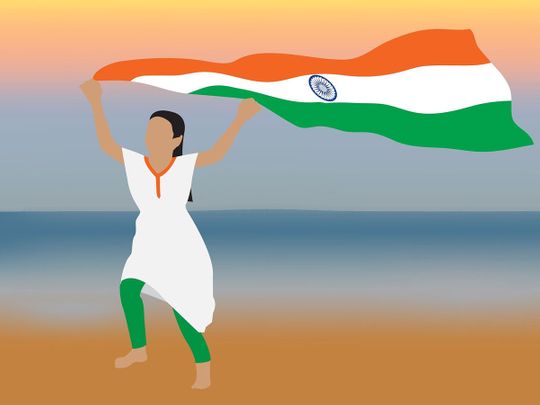
“A moment comes, which comes but rarely in history, when we step out from the old to the new, when an age ends, and when the soul of a nation, long suppressed, finds utterance.”
The words age and yet they don’t, still piercing the flesh with the reminder that freedom, especially as hard fought as ours, is absolute and its protagonists unwavering despite hostile winds.
India @75 is at crossroads. Those growing up without the shadow of partition are alienated from the seismic upheaval that displaced 15 million people and killed more than a million. This ignorance has been further fanned by flames of majoritarian hostility to dismiss leaders who painstakingly pointed an infant nation towards a new dawn.
It was the beginning of a journey, but was mistaken for the end, and now we are caught in the middle.
The benefits from Nehru’s foresight
What could be more telling when even the great Mahatma is not spared and those who sin with his name or his killer’s carry on, substituting his legacy of faith with one that is naked in its hatred today. In this stream of consciousness, history is not in the pages gathering dust since 1947 yet, manifesting won’t change the road trodden, it was Jawahar Lal Nehru as India’s first prime minister who addressed the nation from the ramparts of the Red Fort for the inaugural time on August 15, a tradition that remains.
The much-reviled Nehru delivered in the moment, the lens of hindsight is lazy, it removes perspective. Societies evolve, people move to a better tomorrow. It is human nature. Bigotry is also lazy, it is brainwashed into clutching a target for survival, more so in the confines of a social media trend. But these arrows of irreverence rebound for the past may be changing, but then can we still call it history?
Perhaps his scientific temper threatens more at a time when science is missing both logic and rationale, confronted directly by religious beliefs. But Nehru’s words spoken as long back as a decade before independence could not be more relevant today, “It is science alone that can solve the problems of hunger and poverty, of insanitation and illiteracy, of superstition and deadening custom and tradition, of vast resources running to waste, of a rich country inhabited by starving people.” Whether it was the Atomic Energy Commission (AEC) or Defence Research and Development Organisation (DRDO), technology was at the core of his scientific beliefs.
Sardar Patel, Subhash Chandra Bose, Bhagat Singh and so many other unsung heroes chipped away with their lives and valour, unity in diversity may sound catchy in textbooks but to take along people who spoke more than 500 dialects needed something special.
We are reaping the benefits of IIT, IIM, AIIMS and many other institutions that make us a global hub for education and healthcare, allowing us to dream bigger. As Rajnath Singh says about Nehru, “You cannot question his intentions.” It isn’t easy to apply the same statement to contemporary leaders, 75 years later, the old world statesman has himself disappeared.
Sardar Patel, Subhash Chandra Bose, Bhagat Singh and so many other unsung heroes chipped away with their lives and valour, unity in diversity may sound catchy in textbooks but to take along people who spoke more than 500 dialects needed something special. And that resilience has been the backbone of the country where course correction is inevitable, however dark a night. Droupadi Murumu, a Dalit woman, is now the president of the nation though much like the missing statesman the office of the first citizen has also eroded with each passing year to become ceremonious. Independent India’s first president Dr Rajendra Prasad openly clashed with his prime minister on issues, even sending off an angry letter to Nehru. Recent presidents, barring perhaps APJ Abdul Kalam have come and gone.
A new Parliament building will open its doors, putting a final nail in the colonial coffin, but what of democracy itself, once vibrant, is today celebrating a momentous occasion battered and bruised? From Mahabharata to Ramayana, dissent has been central to India’s ancient cultures moulding Hinduism into something that was bigger than us all. It was also another word for Mahatma Gandhi’s Satyagraha. In the words of historian Romila Thapar, “Dissent was intrinsic to Indian thought as it was to ways of thought and behaviour in all civilisations. It was and is an essential step in the advance of knowledge.”
Did we take a mature democracy for granted? Government institutions have been gnawed at over political tenures to reach the 75th year incapacitated and shackled. Centre-state relationships are uneasy and fundamental rights enshrined in the Indian Constitution, which will next celebrate its 75th, tremulous.
As history has been witness, we fall when we question ourselves. When India is weak, it is plundered, both its fabric and its idea, whether it’s the Mughals or majoritarian insecurity that scoffs at pluralism. Development is not without its people, roti, kapda remains universally aspirational even for those who snub it in the throes of faux nationalism while makaan and dreams are bulldozed overnight.
What does independence day mean to me? It is a day where I salute the sacrifices of countless freedom fighters, including my grandfather, who laid out a path for us, but it is also a day that is celebrated in myriad journeys that inspire daily, of a young man from Haryana’s Panipat who wins an Olympics gold or the daughter of an auto-rickshaw driver who wins a beauty pageant.
Patriotism is not just about putting the Tiranga as a social media profile, just as a diya on Diwali does not curb pollution. But it is a reminder to filter the noise, of those who did not partake in the freedom struggle or respect it. Where the country goes from here, the choice is ours. That is the only essence at the stroke of midnight.









